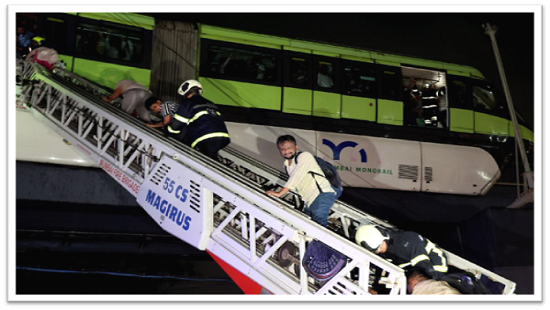
Mumbai Monorail Halts Midway Again: 17 Rescued as Fire Brigade Response Raises Safety Questions
Mumbai’s Monorail faced another operational disruption on Monday morning when a train halted near Mukundrao Ambedkar Road junction, leaving 17 passengers temporarily stranded. While all passengers were safely evacuated by the monorail’s technical team before the fire brigade arrived, the incident has highlighted concerns over emergency preparedness and response efficiency.
The train, running from Sant Gadge Maharaj Chowk to Chembur, stopped at approximately 7 am due to a technical glitch. No injuries were reported, and the halted rake was later moved to Wadala through coupling operations. However, sources indicated that the fire brigade arrived more than half an hour after the monorail staff had already completed the evacuation. Similar delays in previous incidents have raised questions about the readiness of emergency services in case of a serious accident.
Details of the Incident
During the halt, emergency batteries maintained air-conditioning and lighting inside the monorail coaches. Commuters, however, reported discomfort due to limited ventilation during prolonged evacuation. Officials noted that newly procured monorail rakes equipped with advanced technology are still undergoing safety tests to ensure smooth integration with the existing system.
The monorail line, spanning 17 kilometers between Chembur and Sant Gadge Maharaj Chowk, operates 118 trips daily at 18-minute intervals. Ridership remains modest, with around 16,000 passengers on weekdays and 10,000 on weekends. The system provides an important commuter alternative, but operational interruptions impact passenger confidence and highlight infrastructure challenges.
Steps Towards Improvement
The Mumbai Metropolitan Region Development Authority (MMRDA) has ordered 10 new monorail rakes from Medha Servo Rail Pvt. Ltd., each costing Rs 58.9 crore, with some already undergoing trial runs. Authorities emphasize the need for rigorous safety testing, enhanced technical integration, and better coordination with emergency services to prevent delays during future disruptions.
Lessons in Urban Transport Safety
Monday’s incident underscores the importance of reliable emergency protocols and well-coordinated operations in urban transport systems. While the monorail’s technical staff demonstrated effective crisis management, repeated delays by external rescue teams highlight the need for improved response times. Efficient urban mobility relies on a combination of modern technology, trained staff, and rapid emergency support.
The Mumbai Monorail disruptions, though non-injurious, point to broader challenges in ensuring commuter safety and operational reliability. Strengthening emergency preparedness, integrating advanced rakes, and monitoring backup systems are essential steps to maintain public confidence and ensure safe, efficient transit in the city.




